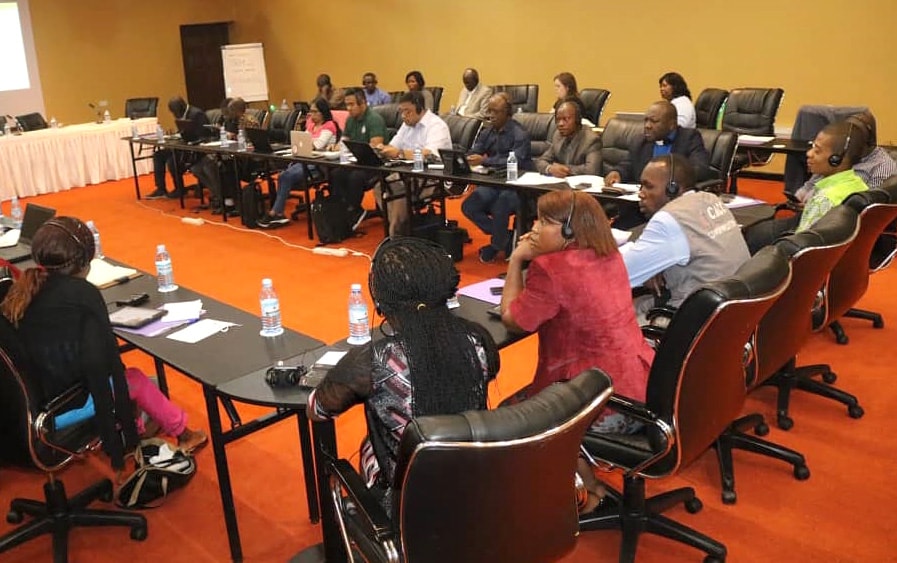
O bispo Daniel Wandabula, da Área Episcopal da África Oriental, pediu união durante a quinta reunião anual da Rede de Rádio Metodista Unida, notando que a rádio é uma ferramenta importante para ajudar a unir a denominação após a divisão da Conferência Geral especial.
Quarenta e três participantes das Conferências da África Central e das Filipinas participaram da reunião de 25 a 27 de abril. Entre as novidades na Conferência deste ano estavam os participantes da República Centro-Africana, Etiópia, Ruanda, Sudão do Sul e Tanzânia.
“Una a igreja ao invés de perpetuar as divisões”, disse Wandabula ao grupo de comunicadores que compõem a rede lançada em 2015 para apoiar e recorrer a ministérios de rádio existentes e aspirantes.
Atualmente, a Rede de Rádio Metodista Unida inclui quatro estações de rádio na África: Voz da Esperança (Côte d'Ivoire), Rádio Kairos (Angola), ELUM 98.7 (Libéria) e Rádio Lokole (Congo). As Filipinas operam a Rádio Wesleyan, que está dentro da Wesleyan University Philippines, o único campus Metodista Unido no país.
Abordando a profunda fragmentação na Igreja Metodista Unida após a aprovação do Plano Tradicional pela Conferência Geral, que reforça a proibição de clérigos homossexuais e casamentos entre pessoas do mesmo sexo, Wandabula disse que a rádio pode ajudar a unir Metodistas Unidos de diversas convicções.
“A rádio é o meio mais eficaz de espalhar notícias”, disse ele, gabando-se das mais de 500 estações de rádio em Uganda, algumas das quais são rádios comunitárias e cristãs.
O líder episcopal da África Oriental apelou à paz, unidade e tolerância na ligação da Igreja Metodista Unida. “Depois de tudo isto, devemos permanecer irmãos e irmãs ao permitir que o poder de Deus trabalhe em nós”.
Carlos Gouveia, coordenador da Rede de Rádio Metodista Unida e chefe da Rádio Kairos de Angola, juntou-se ao coro de unidade, declarando: “Deus fala todas as línguas e antes dele, não há anglófonos, francófonos, portugueses ou suailis… e nossa rede deve refletir isso”.

Os participantes da reunião anual da Rede de Rádio Metodista Unida ouvem os fones de ouvido durante parte da conferência, de 25 a 27 de abril, em Kampala, Uganda. Foto do Rev. Taurai Emmanuel Maforo.
Embora o bispo tenha dito que era necessário que a rede de rádio esclarecesse o assunto contencioso da sexualidade humana, informando as conferências anuais sobre os processos, ele argumentou que a África é confrontada com muitos outros desafios que a igreja precisa abordar.
"Eu me pergunto se a igreja teria sido diferente se as cláusulas de sexualidade nunca estivessem lá no Livro de Disciplina, em primeiro lugar", acrescentou.
Wandabula também falou sobre o recente ciclone Idai que devastou Moçambique, o Malawi e o Zimbábue e a crise no Sudão do Sul. Ele chamou os comunicadores africanos para contar a história de tais tragédias.
Joyce Jaka, uma participante do sul do Sudão, fugiu para Uganda como refugiada.
“Nós fomos deslocados do Sudão do Sul pelos conflitos extremos do meu país”, disse ela. “Esta reunião foi útil para mim, mas não há como voltar para casa… Algo deve acontecer para resolver os problemas em casa”.
"Estou, no entanto, aliviada por isso, enquanto não posso voltar, a estação de rádio em casa e em campos de refugiados está fazendo o trabalho por nós", acrescentou.
Comunicadores com estações de rádio existentes na rede contaram histórias de como eles aumentaram a conscientização sobre o Ebola, campanhas anti-malária e recentes deslizamentos de terra em Serra Leoa. Representantes das Filipinas fizeram uma apresentação em seu ministério de rádio que envia alertas antecipados através da Associação de Rádio Amadora das Filipinas.
"Estamos entusiasmados por podermos compartilhar com os que estão fora das Filipinas através do ministério de rádio". “Deus é bom", disse Kier Ocampo.
Delegados de Moçambique e do Zimbábue, no entanto, lamentaram a falta de estações de rádio comunitárias nas áreas atingidas pelo ciclone Idai. Eles disseram que esperavam o estabelecimento de estações de rádio nesses países da África Austral para servir suas comunidades.
Pacome Nguessan, secretário executivo da Rede de Rádio Metodista Unida, implorou às conferências anuais que possuem projetos de rádio, que não esperassem apoio unilateral da rede, observando que os resultados podem ser alcançados através do trabalho em conjunto.
"Enquanto você espera algo de nós (a Rede de Rádio Metodista Unida), também esperamos algo de você", disse ele.
Lydie Acquar, o primeiro coordenador da rede e diretor da estação na Voz da Esperança, concordou. "Precisamos começar a ver alguns movimentos sérios e positivos em cada conferência anual para que a rede abra suas asas mais rapidamente", disse ela.
Wandabula pediu à rede de rádio que se tornasse um “órgão autogovernado, autopropagado e autofinanciado”. Ele aplaudiu o sistema de financiamento da rede, no qual as conferências anuais contribuem por meio de assinaturas e taxas de filiação.
Ashley Gish, diretora de estratégia de comunicações globais das Comunicações Metodista Unida, elogiou o compromisso da rede com o sucesso do ministério de rádio na África e nas Filipinas e disse que a agência de comunicações continuará apoiando a rede como uma parceira facilitadora para crescer o ministério de rádio globalmente”.
* Maforo é comunicador da Área Episcopal do Zimbábue. Contato com a imprensa: Vicki Brown em (615) 742-5470 ou newsdesk@umcom.org.
** Sara de Paula é tradutora independente. Para contatá-la, escreva para IMU_Hispana-Latina@umcom.org



